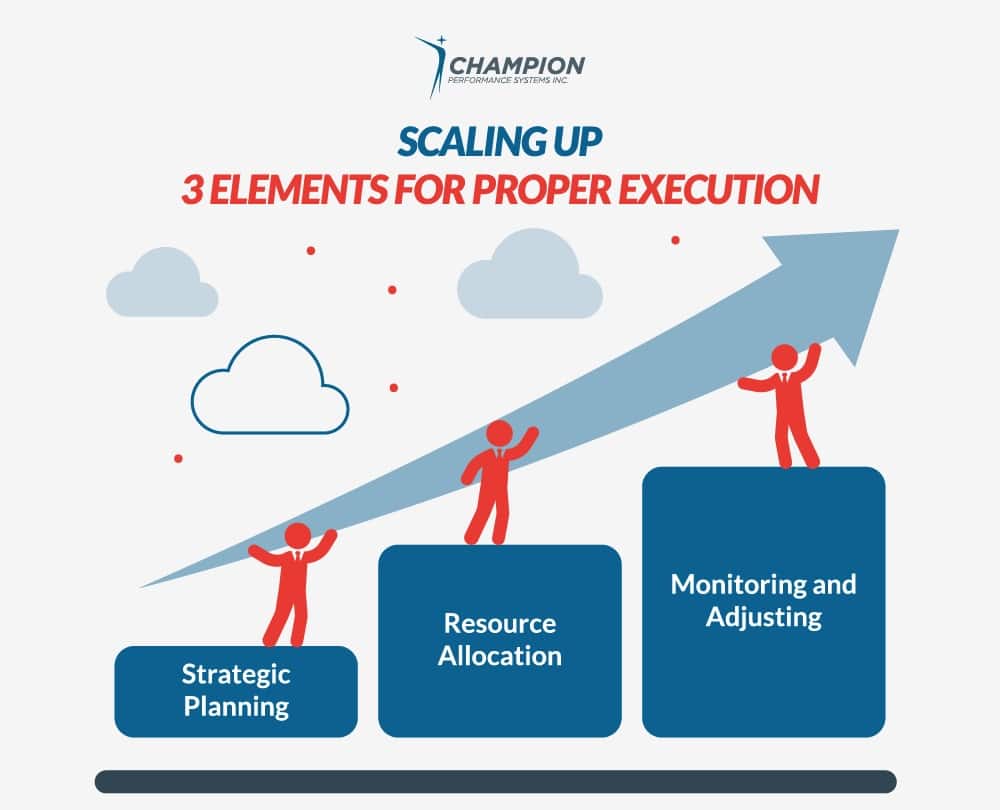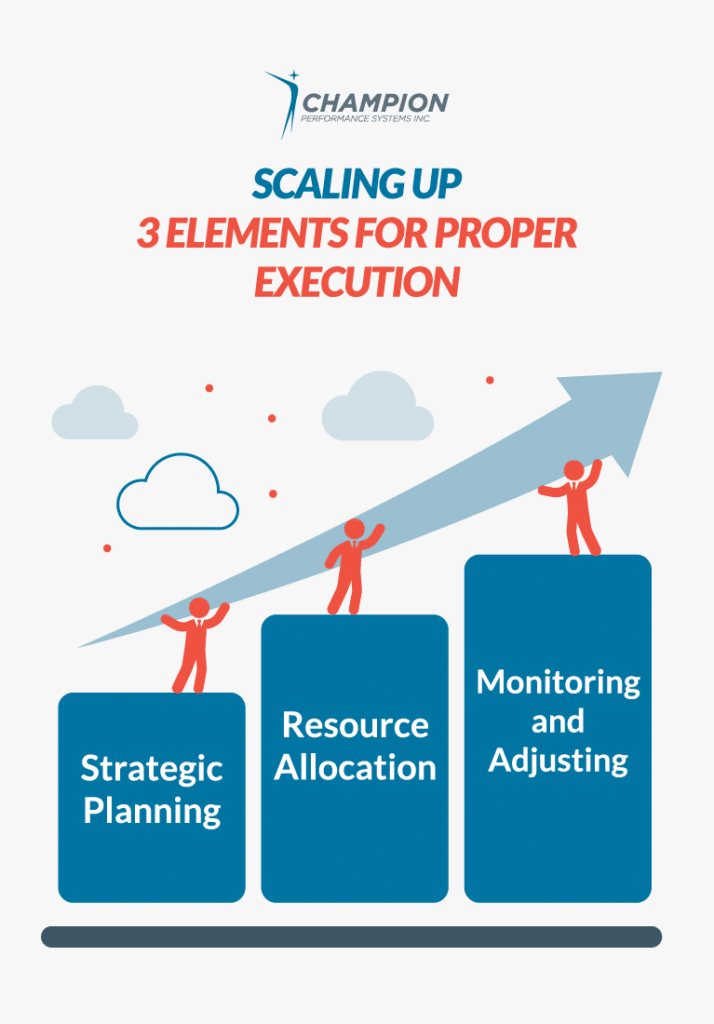In the constantly evolving world of business, scalability isn’t just a buzzword—it’s a crucial factor that can make or break your venture’s success. Whether you’re a seasoned executive, a budding entrepreneur, or part of a family business, understanding the concept of scalability and its impact on your enterprise could be the key to unlocking unprecedented growth.
This blog post will delve into the essence of scalability, showing you not only what it means to “grow at scale,” but also providing real-world examples of businesses that have successfully scaled. More importantly, we’ll explore how you can enhance the scalability of your business model, leading to sustainable and long-term growth.
As we navigate the intricacies of scalability, we’ll also shed light on how Champion PSI’s services can support your business’s scaling efforts, execute a scaling plan, and propel you toward your business goals.
Understanding Scalability in Business
Scalability, in the realm of business, refers to a company’s ability to increase its output or productivity in response to growing demand. Simply put, your business can expand without compromising performance or profitability. That means that as demand for a business’s products or services increases, it can add resources (such as personnel and equipment) to keep up with the growth without compromising performance. This is in contrast to non-scalable businesses which are not resilient enough.
Why does scalability matter? It allows businesses to handle growth in a cost-effective manner. As the business grows, a scalable business model will not require the same rate of resource allocation increase to manage that growth. This is crucial in maintaining profitability and ensuring the business remains competitive.
Just as a building needs a strong foundation to withstand growth in size, a business needs scalability to support its expansion. The scalability of your business operations and model is a key determinant of your business’s potential for growth and profitability.
The Concept of "Growing at Scale"
Growing at scale is a concept that refers to a business’s ability to increase its operations and profits proportionately as it adds resources. It means that as a business expands, it can maintain or even improve its performance and efficiency. This is considered a desirable trait in a business, as it indicates the potential for sustainable growth.
The benefits of growing a business at scale are numerous. Firstly, it allows businesses to maximize their return on investment as they grow, as the increase in output is greater than the increase in input. Secondly, a business that can grow at scale is often more competitive in its market, as it can provide its products or services more efficiently and at a lower cost than its competitors.
However, growing at scale also presents its own set of challenges. It requires careful planning and management to ensure that the business’s operations remain efficient as it grows. It also requires constant monitoring and adjustment as the business environment changes. The ability to grow at scale is not a given; it is something that businesses must work towards and maintain.
This is where guidance from an executive coach can be an invaluable asset. With their expertise, businesses can enhance their scalability, unlock their potential, and thrive in the ever-changing business landscape. With proper execution, a business can achieve seamless growth, optimize its operations, maximize profitability, and establish a strong competitive advantage in the market.
2 Real-World Examples of Scaling Businesses
In the world of business, various standout examples underscore the significance of scaling.
Amazon
Amazon, for instance, started as an online bookstore but effectively scaled into a global e-commerce giant by constantly diversifying product offerings and expanding its market reach. The company’s ability to scale efficiently has been instrumental in its journey from a small startup to a multinational conglomerate.
Airbnb
Another inspiring example is Airbnb. Initially, the company was a simple online platform where people could rent out their unused spaces. However, Airbnb’s founders saw the potential for scaling and started to incorporate a variety of accommodation types, from shared rooms to luxury villas and even entire castles, catering to a broad range of traveler needs and budgets. They also expanded their geographical footprint and are now present in more than 220 countries and regions around the world. Though not easy, this expansion has proven to be highly successful.
These examples demonstrate that effective scaling involves more than just growing the business; it requires strategic planning, continuous innovation, and anticipation of market trends and customer needs. It is through effective scaling that these businesses have managed to achieve sustained growth and dominance in their respective industries.
The Scalable Aspects of a Business Model
It’s important to note that scalability can be found in various areas of a business model.
For instance, if you’re in the tech industry, your software or platform may be a scalable aspect, as it can serve an increasing number of users without the need for additional human resources. For a manufacturing business, scalability may lie in the production process, where increased output can be achieved with minimal increase in production costs.
Strategies to enhance scalability in these areas can vary widely, based on the nature of the business. It could involve automating processes, investing in technology that can handle increased demand, or even adjusting the business model itself. For a service-based business, scalability could be achieved by standardizing and documenting processes, allowing for easy replication and consistent quality as the business grows.
Understanding the scalable aspects of your business model is a critical first step in achieving enhanced business scalability. By focusing on these areas, businesses can prepare for growth while maintaining efficiency and cost-effectiveness, ultimately leading to improved profitability and sustainability.
The Role of Scalability in Business Success

Scalability plays a pivotal role in the success of any business. A company can handle increased market demand without compromising performance or revenue generation capability.
A scalable business can expand seamlessly, serving a growing customer base efficiently. This characteristic is a key determinant of a company’s potential for long-term growth and sustainability.
Factors such as the ability to handle increased workload, efficient resource utilization, and the flexibility to adapt to market changes determine the scalability of a business. A scalable business model is marked by steady revenue growth that outpaces the increase in operational costs. This means the more a business grows, the higher its profit margins become.
The correlation between business success and scalability is evident. Scalable companies can easily adapt to changes, seize new opportunities, and overcome challenges. They are better positioned to meet customer demands and stay competitive in the marketplace. The ability to scale helps businesses to sustain operations, even during periods of economic uncertainty.
3 Critical Elements for Scaling Up Execution
While understanding the concept of scalability is crucial, proper execution is equally important for successful scaling. Without a well-executed plan, businesses may struggle to effectively grow at scale and may encounter challenges that hinder their progress. Proper scaling execution involves strategic planning, effective resource allocation, and continuous monitoring and adjustment.


Strategic Planning
One key aspect of proper scaling execution is strategic planning. This involves setting clear goals and objectives, identifying the areas of the business that need to be scaled, and developing a roadmap to achieve those goals. A comprehensive scaling plan takes into account market trends, customer demands, and potential obstacles, allowing businesses to navigate the scaling process smoothly.
Resource Allocation
Effective resource allocation is another critical element of scaling execution. As a business grows, it must allocate resources such as personnel, equipment, and technology to meet the increased demand. Proper resource allocation involves assessing the scalability of different aspects of the business, identifying areas that need additional resources, and strategically investing in those areas to support growth.
Monitoring and Adjusting
Continuous monitoring and adjustment are essential throughout the scaling process. As the business expands, it is important to regularly assess performance, identify bottlenecks or inefficiencies, and make necessary adjustments to ensure smooth operations. This may involve streamlining processes, optimizing workflows, or implementing new technologies to enhance
By executing scaling plans effectively, businesses can overcome challenges, seize new opportunities, and achieve sustainable growth.
Champion PSI’s coaching and consulting services can help businesses navigate the complexities of scaling execution, providing valuable guidance, support, and resources.
Champion PSI's Role in Enhancing Business Scalability
Champion PSI plays a pivotal role in facilitating business scalability. Leveraging a wealth of experience and deep industry knowledge, the company provides comprehensive services tailored to the unique needs of each client. With a focus on scalability, Champion PSI’s services are designed to foster growth, enhance operational efficiencies, and bolster the bottom line.
From business coaching to consulting services, Champion PSI’s offerings are multidimensional. The company’s business coaches work closely with clients to identify their scalability needs, develop effective strategies, and drive implementation. Their consultative approach helps businesses navigate the complexities of scaling, providing valuable insights and guidance every step of the way.
Moreover, Champion PSI’s consulting services offer businesses a roadmap to scalability.
Through a rigorous analysis of business operations, they identify scalability gaps and help devise a strategic plan to address them. The services also cover other crucial areas such as investment management, budgeting and forecasting to ensure proper execution of the scaling strategy.
In essence, Champion PSI acts as a catalyst, propelling businesses towards scalability and, by extension, success. Through their coaching and consulting services, they help businesses unlock their potential, enabling them to grow sustainably and profitably.
Steps to Improve Your Business's Scalability with Champion PSI
Getting started with Champion PSI to improve your business’s scalability is a straightforward process. It begins with an initial consultation where you can discuss your business goals, current scale, and areas you wish to improve. This is an opportunity to identify the scalable aspects of your business model and map out a strategy for enhanced scalability.
Champion PSI’s team of experienced coaches and consultants will then work with you to implement this strategy. They provide ongoing support and guidance, helping you navigate the complexities of scaling a business. This includes addressing any challenges that arise, offering expert advice, and providing resources to assist in your business’s growth journey.
When working with Champion PSI, you can expect tangible outcomes. These include improved operational efficiency, increased revenue growth, and enhanced competitive advantage. You’ll also gain the ability to adapt to market changes more effectively, a crucial aspect of scalability.
Moreover, Champion PSI’s impact isn’t just limited to the business’s bottom line. They also focus on developing leadership skills, fostering a growth mindset, and building a scalable company culture. These are key elements that contribute to the sustainability of your business’s growth.
Ready to Thrive in the Ever-changing Business Landscape?

Understanding the importance of scalability and effectively implementing it are pivotal steps in business growth and success. Champion PSI, with its wide range of coaching and consulting services, including their Scaling Up business training, stands ready to guide businesses, from startups to established firms, on their journey towards enhanced scalability.
We invite you to sign up for a free Scaling Up assessment, where you’ll complete a quick compatibility assessment and engage in a quick discovery call. If there’s a good fit, you’ll receive a Scaling Up assessment, valued at $1,500, at no cost to you.
Let us work together in crafting a scalable business model designed for long-term sustainability and growth.










